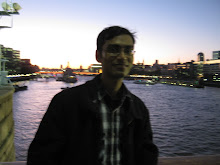Goo-tube

One of the major aspects of a ''network society'' is the importance of Information Economy. Google purchasing Youtube for $1.65bn is the perfect example of the burgeoning growth of networking enterprise. Google( a powerful search engine, store house of information) purchased Youtube (a video sharing site) for multitude reasons, but the central driving factor has to be the economy.
"The YouTube team has built an exciting and powerful media platform that complements Google's mission to organize the world's information and make it universally accessible and useful," said Eric Schmidt, Chief Executive Officer of Google.
Beneath this ideology of information sharing lays the triumph of online video which in irony, Google's interest in online video has a lot to do with its belief in the staying power of conventional broadcast television and cable.

The main stream of revenue for Google comes through advertising. By simply placing video adds next to You-tube's loads of video streams (Youtube claims that users view nearly 100 million video-streams each month) will ensure hefty profit.
Google has stated that their ambition into the business of placing ads in print, radio and television. Inspite of the fact that Google's purchase of Youtube is the largest acquisition of any broadcasting company, it’s true that television advertising is still the biggest ad market of all ($61 bn compared to net's $8bn in USA, 2009).
Google CEO Eric Schmidt has not been secret about his ambitions to take this project into the realm of OLD MEDIA too. This summer at a conference he said Google would soon deliver "targeted measurable television ads" and complained that today when you watch TV you see commercials that are "a waste of your time," and "clearly not targeted for you."

Google through the process of refinement & repetition identifies effective adds, because the advertisers only pay for ads that attract user attention as evidenced by clicks. Similar process has been used in Google's Adsense service. It places ads on the Web sites of affiliates with which it shares ad revenues. In a nutshell, Google eliminates those ads which they find unattractive for the users.
This repeat & refine approach has a lot to do with market research, like how many clicks one particular advertisement gets, how many people are willing to chose to view it, how it will fare on youtube compared to ''OLD MEDIA'' versions etc . Google has taken a huge stride in online advertising which out muscles its fellow competitors. It is already looking ahead to a still-to-come era, when others are still trying to find the methodology. Hats off!!!
Bibliography
1) steven conway's lecture & slide
2)http://money.cnn.com/2006/10/18/technology/fastforward_gootube.fortune/index.htm
3) http://www.zdnet.com/blog/micro-markets/google-ceo-wants-74-billion-tv-ad-market/357




